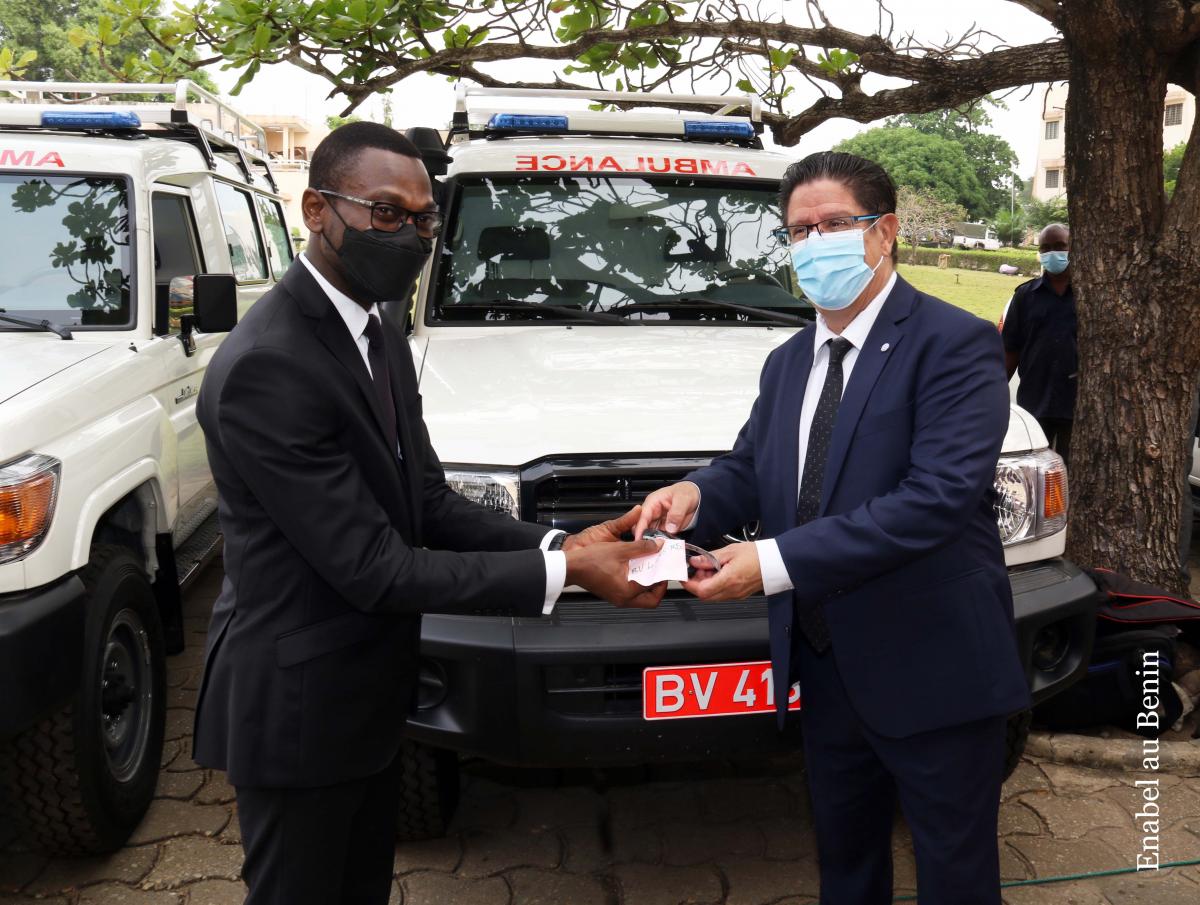Rechercher
Affichage de 2025 à 2040 sur 3120 actualités
-
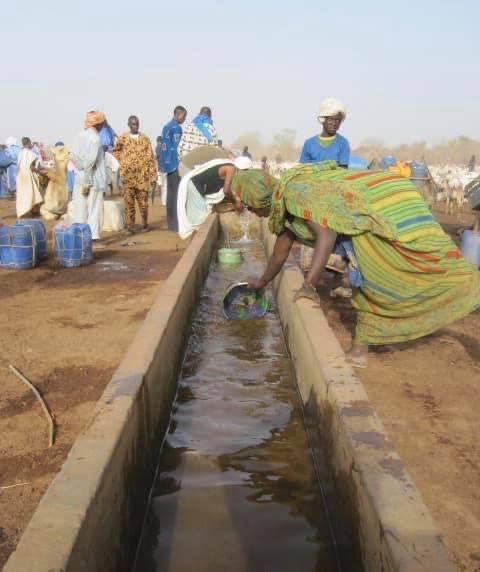
Au Mali, Enabel apporte une réponse résiliente à la dégradation des conditions de vie des pasteurs dans le cercle de Nara
Nènè TRAORE | 04/02/2021
Le cercle de Nara dans la région de Koulikoro est une zone pastorale par excellence. Il dispose d'atouts importants à même de soutenir les productions animales et de jouer un rôle majeur dans la sécurité alimentaire.Dans cette entité géographique sévit un élevage extensif parfaitement adapté au climat qui est structurellement instable. Le cercle de Nara s'étend sur une superficie de 30.000 Km² pour une population de 192.493 habitants soit une densité théorique d'à peine 2hbts / km2. Cette faible densification humaine est favorable au pastoralisme, donc, à la création de périmètres pastoraux (PP). Dans ce cercle de l'élevage, pratiqué par 80% de la population rurale est l'activité principale pour plus de 40% des ménages. Le cercle est réputé, zone à dominance pastorale où cohabitent, les modes d'élevage, sédentaire et transhumant. Le cercle de Nara depuis 2019 compte 21 PP et une aire pastorale intercommunale. La superficie de l'ensemble de ces périmètres, est évalué à environ 390.000ha. Ces périmètres sont ouverts au bétail chaque année, environ neuf mois sur douze, soit 270 jours. Plus de 60.000 bovins y pâturent, sans compter, de milliers de petits ruminants, équins, camelins et asins et animaux transhumants de passage. La gestion de chaque périmètre est confiée à une société coopérative pastorale d'éleveurs organisée et formée à cet effet, afin de garantir la durabilité des installations. Les bilans financiers de la campagne 2018-2019 des 16 périmètres pastoraux réalisés en mars et mai 2020 donne une mobilisation environ de 33.300.000 F CFA dont en moyenne environ 2.000.000 F par périmètre pastoral. Une étude récente commanditée par l'Intervention Appui aux Renforcements de l'élevage et de l'Économie dans la région de Koulikoro(AREPK) sur sept périmètres pastoraux donne une diminution de la superficie de six sur sept périmètres pastoraux. La raison principale de la diminution des superficies, évoquée est l'empiétement par les cultures de plus en plus accentués, source de conflits. Au regard des potentialités pastorales dont regorgent chaque périmètre pastoral et la présence de conflits latents, il devient alors nécessaire d'envisager la gestion durable et rentable de ces ressources en faveur d'un développement durable, c'est-à-dire celui-ci l 'avenir des générations futures. Pour pallier cette problématique, Enabel dans la mise en œuvre du AREPK envisage la sécurisation à travers le balisage et l'immatriculation de sept périmètres pastoraux pilotes afin de préserver ces espaces exclusivement réservés à l'élevage extensif. Aperçu sur les conditions de vie du pasteur avant les PP:Elles se caractérisent, de janvier à juin ou juillet, par:• de pénibles recherches de pâturages pour le bétail; • d'énormes difficultés de faire abreuver le bétail; • des pertes de milliers d'hectares par les feux de brousses incontrôlés (plus de 180 000 hectares de pâturages étaient brûlés annuellement dans le cercle de Nara); • des pertes d'embonpoint des animaux, les dévalorisants sur les marchés; • de fortes mortalités / déstockages des troupeaux des pasteurs.Aperçu sur les conditions de vie du pasteur après l'aménagement des PP:Elles sont vues sous trois angles à savoir la cohésion sociale, la relance économique et l'équilibre écologique. PP facteur de cohésion sociale dans le cercle Les éléments suivants, le confirment: - la diminution des conflits liés à l'utilisation des ressources (un long séjour des animaux sur les PP neuf à dix mois dans l 'année réduite significativement, le déplacement du bétail vers les zones agricoles à la recherche de parcours et d'eau d'abreuvement); - l'organisation des usagers en coopératives stimulant une solidarité sociale; - la reprise des festivités des cérémonies traditionnelles;- la multiplication des activités génératrices de revenus.PP facteur de relance économique dans le cercle Le constat porte sur les éléments suivants: -la présence d'un espace considérable de végétation herbacée sous quelques arbustes et arbres (295.180 ha des PP, ou poussent chaque année une multitude d'espèces herbacées); -la dissémination des espèces végétales par les animaux «zoochorie» (reconstitution de la flore herbacée et ligneuse de la zone;-la diminution de la compétition entre les individus, en les disséminant sur un plus grand territoire; -la diminution de la mutilation arbustes / arbres de la zone; -la préservation des systèmes par la lutte contre les feux brousse; -la préservation des objectifs par le respect de la charge annuelle. Cet espace herbeux, aménagé et sous contrôle consensuel, contribue à perpétuer les espèces herbacées caractéristiques de cette zone agro climatique «le sahel occidental».Le PP comme un des facteurs d'équilibre écologique.Les communautés pastorales dépendent des ressources pastorales comme: le bétail; les fourrages; l'eau. Ces trois ressources sont très liées et sont très sensibles aux changements climatiques. Le PP rend disponible l'eau et les fourrages à la taille du bétail. Par conséquent, le PP est l'un des facteurs d'équilibre écologique. Perspectives pour plus de contribution du PP En résumé, fort de ces constats, il ressort que les aménagements pastoraux ont impacté positivement les conditions de vie des pasteurs du cercle de Nara. Cependant ces aménagements sont sous de risques constants de menaces de leur pérennisation. Fort heureusement, l'intervention AREPK, s'est assignée parmi ses résultats de parvenir à l'immatriculation de ces espaces aménagés, leur assurant une sécurisation administrative. De même, elle s'attèlera également à mettre en place des conventions qui assureront la sécurisation communautaire de ces espaces. Quant à la sécurisation géographique, elle trouve sa solution dans les préliminaires de l'immatriculation.
-
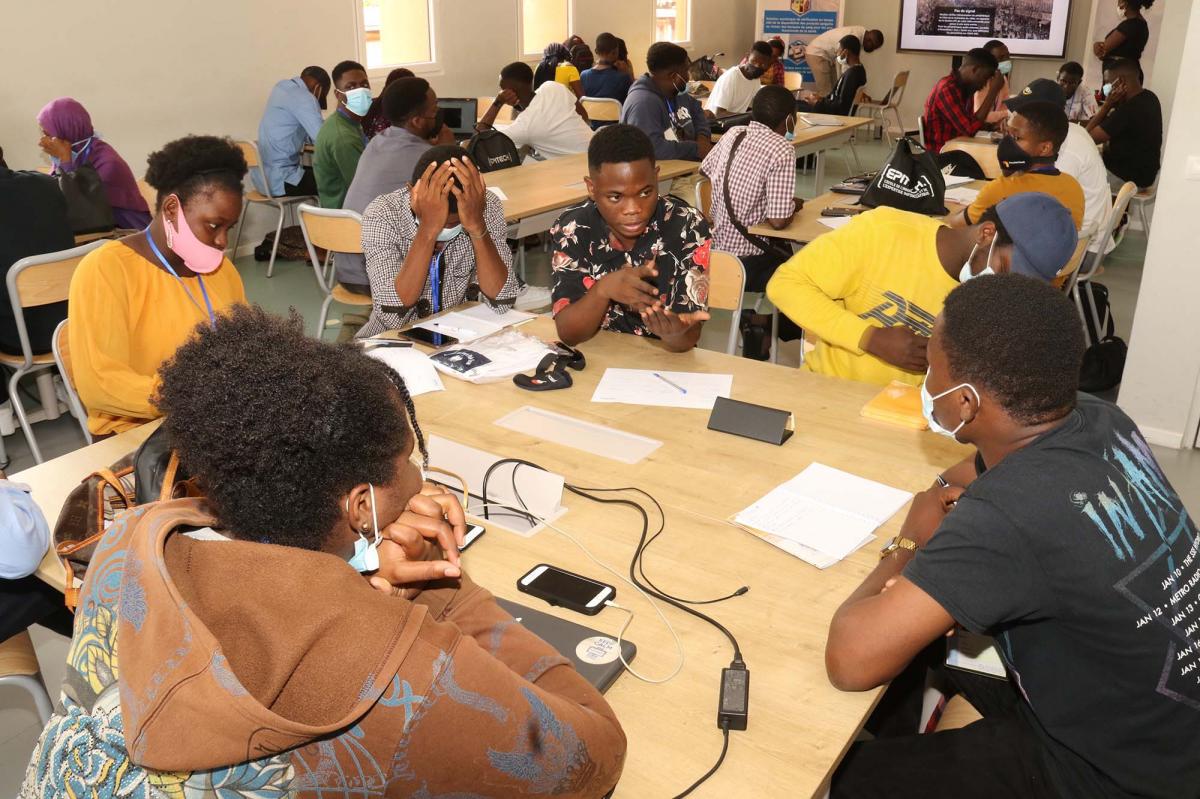
HealthTech Challenge Week: des innovations numériques pour améliorer les services sanitaires au Bénin !
Reece-hermine ADANWENON | 02/02/2021
Promouvoir et stimuler les innovations Health Data au Bénin, voilà le défi que se sont fixés Enabel, le Ministère de la Santé et le premier campus du numérique au Bénin Epitech en lançant ce mardi 2 février 2021 à Sèmè One la première édition du « HealthTech Challenge Week ». Ils sont une soixantaine de jeunes étudiants de plusieurs disciplines (Santé, Numérique, Design …) à participer au HealthTech Challenge. Durant deux semaines, ces jeunes iront à la découverte des besoins et des problèmes de terrain des populations et acteurs du système sanitaire afin de réfléchir à des solutions numériques pertinentes et fonctionnelles pour améliorer les services sanitaires au Bénin.Répartis en plusieurs équipes pluridisciplinaires, ils vont réfléchir et concevoir des prototypes de solutions numériques sur les thématiques suivantes : - Solution numérique de rappel (Voice, Email ou SMS) des rendez-vous de CPN/PF (Consultation Prénatale et Planification Familiale); - Solution numérique de vérification en temps réel de la disponibilité des produits sanguins au niveau des banques de sang pour les professionnelles de santé;- Solution numérique pour inciter le public à participer aux collectes de sang ou à les organiser, la procédure à suivre, etc; - Solution numérique de gestion du parc et des mouvements des ambulances. Au terme de ces deux semaines de challenge, les quatre meilleurs prototypes de solutions numériques, un par thématique, seront sélectionnés et récompensés par un jury. Ces prototypes pourront ensuite être implémentés en fonction de leur pertinence avec le soutien d’Enabel à travers son Programme d’Appui à la Santé Sexuelle et Reproductives et à l’Information Sanitaire « P@SRIS ».
-

Mission Wehubit : nouvelle vidéo d'animation !
Thibaut MONNIER | 01/02/2021
Deux ans et demi après son lancement, le programme Wehubit d'Enabel soutient déjà 18 projets numériques (bientôt 22) dans 11 des 14 pays partenaires de la Belgique sur des thèmes aussi variés que l'autonomisation des femmes et le droit des jeunes, l'agriculture climato-intelligente, l'Esanté et les compétences numériques. Plus d'informations: wehubit.be.Lisez aussi le 1er article de Wehubit publié sur openaid.be !
-
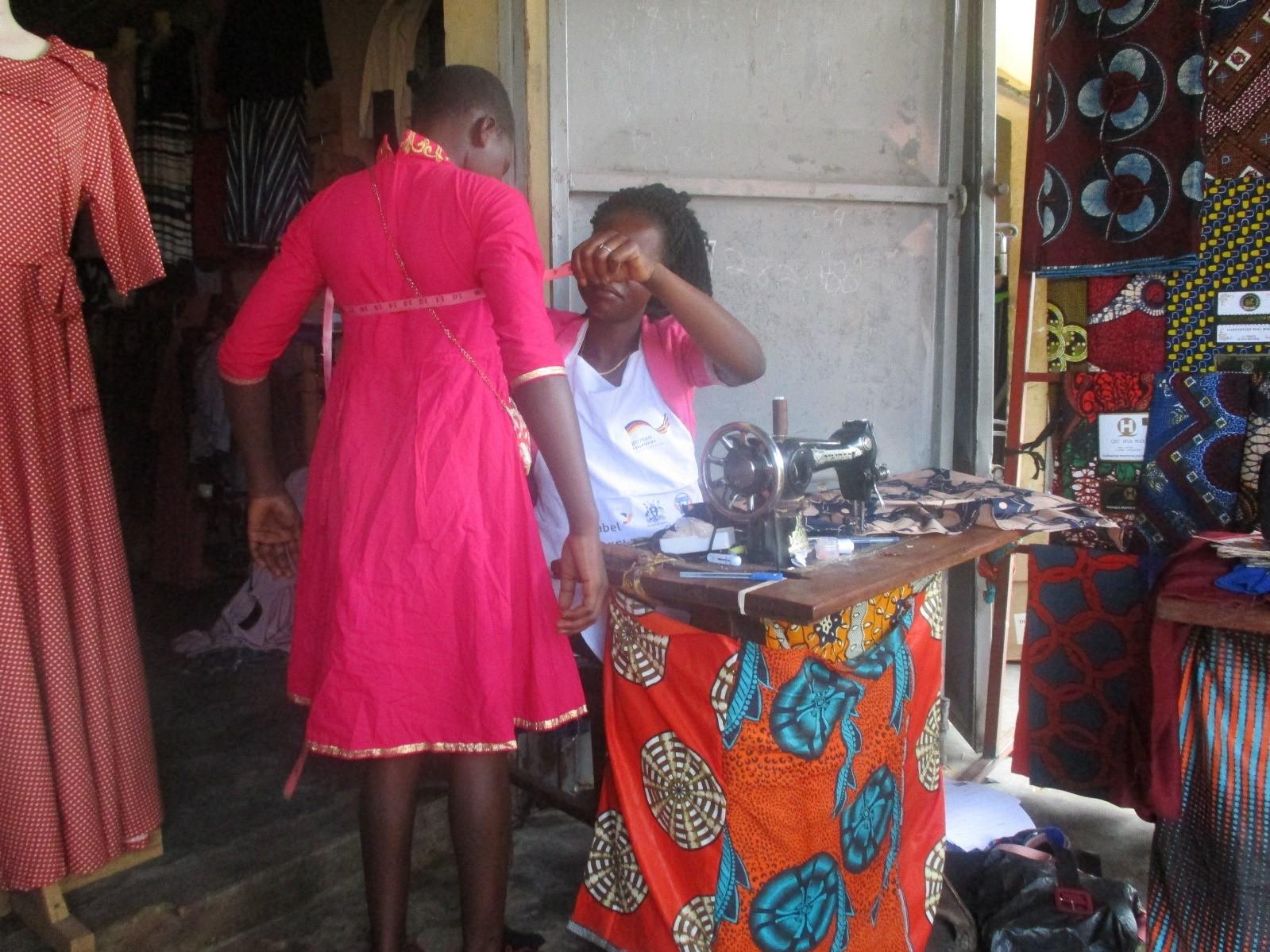
Uganda: Read the story on how Rose escaped a cycle of poverty and abuse
Racheal AKELLO | 01/02/2021
When Rose Aserua looks back upon her short yet eventful life, she praises herself lucky that she was able to escape a cycle of poverty, humiliation, and abuse. Like many other girls in her village in Moyo, Northern Uganda, she was raised by a single mother and married off at a tender age. Being uneducated and unemployed, she was at the mercy of her husband, who abused her. Being a victim of both child marriage and domestic violence, she one day packed her few belongings and ran to her uncle. That’s where the village chief told her about the skills training programme organised by Community Empowerments for Rural Development, with support from the Belgian and German development agencies. After having completed a three-month tailoring course at Moyo Community Polytechnic, Rose was hired by a friend to help her make clothes at her workshop. She now earns between 50,000 and 70,000 Ugandan Shillings a week, enough to take care of herself, support her mother and even save with a local scheme. Her total savings in the Amababa Savings and Loan Association amount to 180,000 Shillings. With the profit, she has been able to rent her own sewing machine at 15,000 Shillings a month and buy a mobile phone, which enables her to communicate with her customers and relatives. Since she started making clothes and also training others, Rose’s esteem in the community has risen considerably. She commands respect for her hard work and determination. “Rose is hardworking and promising,” says Doreen Driciru who organises the local training courses. “The community and her family now see her in a new light.” The now 25-year-old plans to study fashion and design in the future. She hopes to be able to buy a modern sewing kit so that she can nicer clothes. Her ultimate dream is to train her relatives so that they can start a family business. “I am blessed,” she says. “The training transformed my life from misery to happiness. People now believe that vocational training is the best way to address the challenges faced by youth with low education levels.”
-
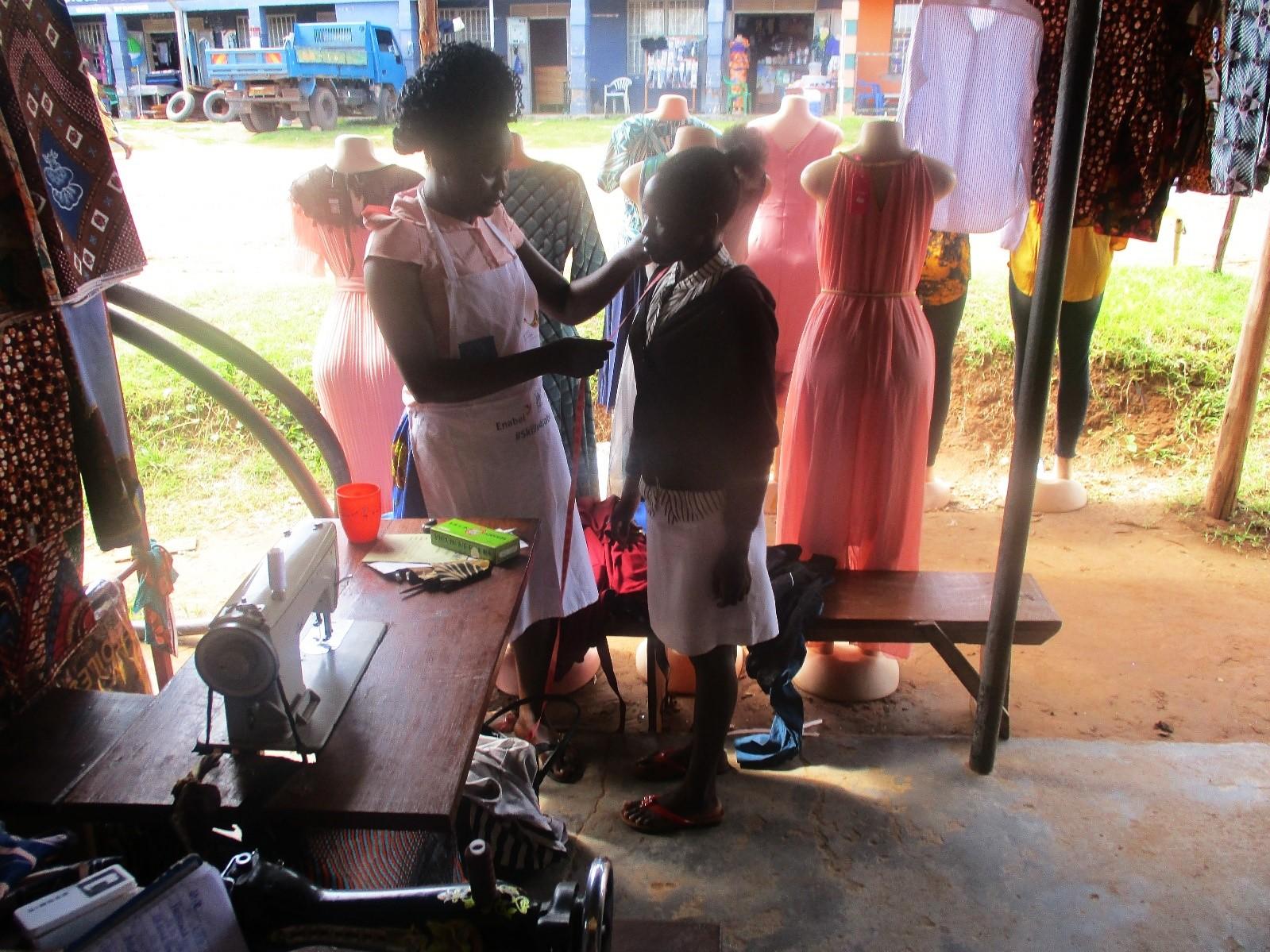
A ray of hope for Vivian Ulea in Uganda
Racheal AKELLO | 01/02/2021
Vivian Ulea had lost hope of ever finding a job. The 29-year-old woman of Besia village in Moyo, Northern Uganda, had dropped out of Senior Four due to lack of school fees. With no means to sustain herself, she depended on her grandmother for such basic items as soap and food. But poverty was rife. Her grandmother, like most people in the village, was a subsistence farmer. When the rains delayed and the harvest failed, she could no longer take care of her. Vivian had no other option but to get married. Little did she know that she would jump from the frying pan into the fire. Her husband neglected and mistreated her. The situation became so bad that she ran back to her grandmother. That’s when she got the idea of standing up for herself and enrolling in a tailoring course. She was motivated by fellow village women who were running successful businesses and able to support their families on their own. “Having witnessed several women in my village being able to take full responsibility for their children by operating sewing machines inspired me,” she says. In 2019, she followed a three-month training course at Moyo Community Polytechnic. The training was organised by Community Empowerment for Rural Development and financed by the Skills Development Fund. Vivian now rents a room in Moyo town where she operates a sewing machine. She earns between 20,000 and 25,000 Ugandan Shillings a week from making clothes. The money enables her to pay her rent, buy basic needs and support her grandmother. The fact that she no longer has to rely on other people has increased her confidence. She now socialises freely and has made many friends. In the future, she wants to train other people in tailoring to supplement her income. With the additional money, she plans to buy land, build a house and go back to school. Since 2019, a total of 1.731 young people have benefited from the Skills Development Fund in Northern Uganda under the German Agency for International Cooperation. Like Vivian, they were able to move from a life of poverty and dependency to self-reliance and happiness.
-
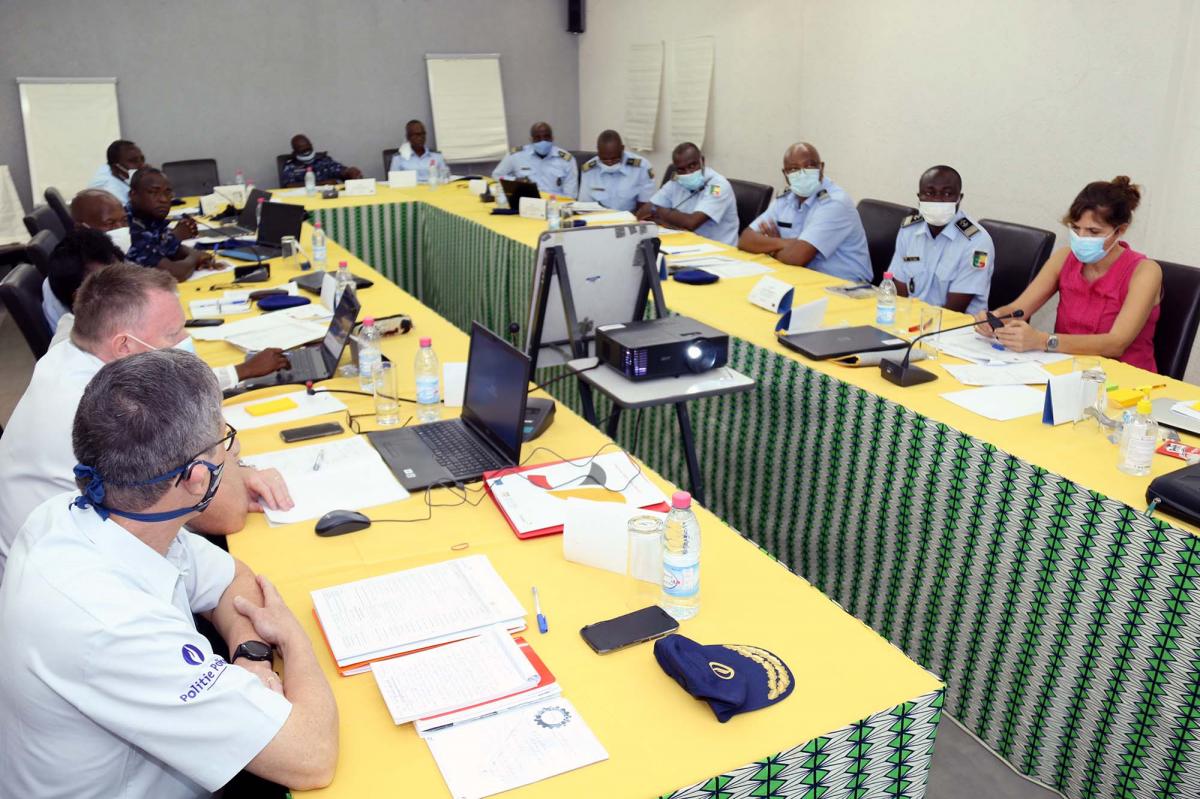
Au Bénin, les cadres de la Police Républicaine en séminaire stratégique avec la police belge!
Reece-hermine ADANWENON | 29/01/2021
Du 18 au 22 janvier 2021, un séminaire stratégique suivi d’une formation en gestion de crise « mini Gold » avec l’Etat major de la Direction Générale de la Police Républicaine (DGPR) a été organisé par le programme « police » d'Enabel. Il visait à soutenir la police du Bénin dans la définition de sa vision stratégique et ses plans d’action, en particulier dans les domaines prioritaires de la police communautaire et la gestion de crise. Tenue à l’Hôtel du Lac de Cotonou, cette semaine de travail stratégique a notamment regroupé les directeurs techniques de la Direction Générale de la Police Républicaine et des directeurs départementaux de la police. Plusieurs points de réflexion ont été abordés et ont permis : - d’identifier des expérimentations innovantes et pratiques à tester dans les deux zones pilotes du programme police (plan de sécurité, recueil des besoins des habitants, accueil des victimes,..),- de fournir des éléments de contenu pour les futurs manuels de formation et procédures à élaborer en matière de gestion de crise, police communautaire et plan de sécurité- d’organiser une première session de formation des policiers de l’Etat Major béninois en matière de gestion de crise (type mini-GOLD) et une mise en pratique par l’organisation d’un exercice type table top - GOLD TTX (Table Top Exercise), durant 3 jours. Une mission de la police fédérale constituée de MM. Marc DEJONGH de la Police Fédérale Belge et Michel GOOVAERTS (Chef de zone Police de Bruxelles Ixelles) a appuyé le programme « Police » comme instructeurs et l’animation de cet atelier fut assurée par Mr Paul NEEFS, Expert Police du projet PAOP-CRI et Mme Véronique KETELAER, IM du Programme Police. Le Directeur Général de la Police Républicaine, M. YAYA Soumaïla au cours de la restitution des travaux, a salué l’accompagnement indéfectible du Royaume de Belgique au secteur de la police et a insisté sur l’importance de l’opérationnalisation rapide du centre de planification et de gestion de crises de la police. Les participants ont reçu, une attestation de participation au séminaire et à la formation « mini- Gold ».
-
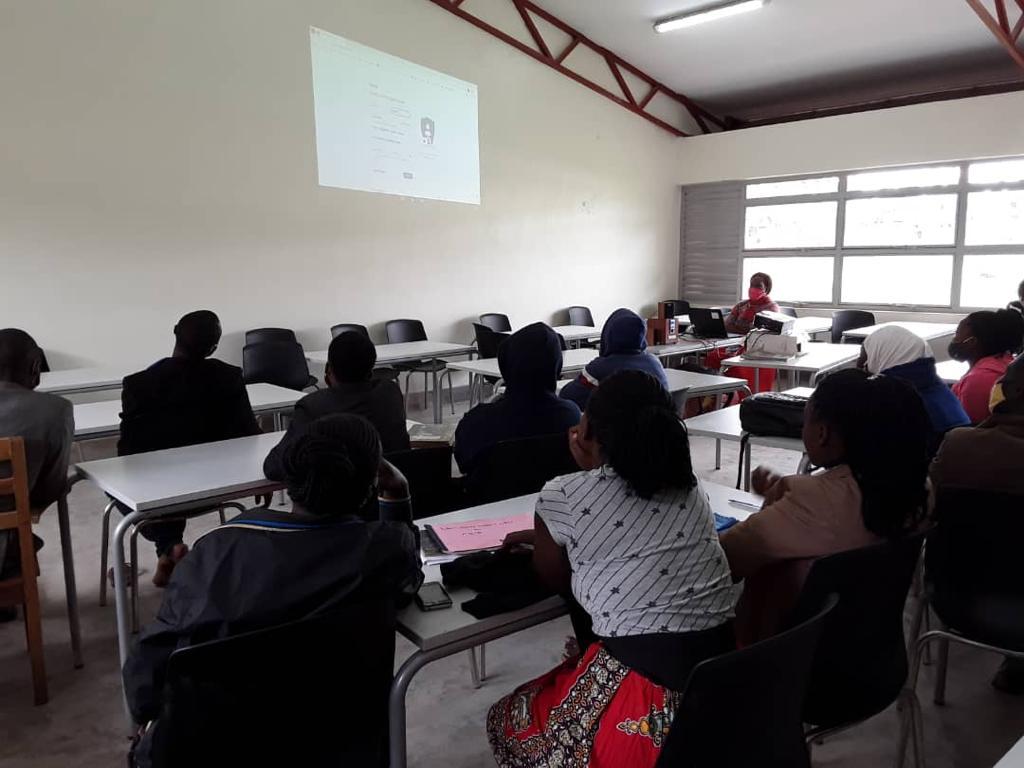
Together, Enabel, the Junior Programme and National Teachers'Colleges join forces to support continuity of learning - Uganda
Dorothy KYAMAZIMA | 29/01/2021
The National Teachers’ Colleges are among the tertiary education institutions in Uganda that have been at the forefront of the new distance learning system since the outbreak of COVID-19. The Colleges with support from Enabel have taken the necessary steps to ensure that there is a continuity of learning by focusing on equipping its teachers with 21st-century skills. These skills ensure that teachers are able to familiarize themselves with new education technology such as google drive, podcasts, padlet and so much more before gradually introducing it into their teaching practice to both create and deliver learning content.The introduction to EdTech has been a gradual process and one that has gained a lot of popularity in the colleges with a growing number of lecturers participating in innovations derived from the TTE Sandbox. Most notable are the Community of Practice Sessions (CoPs) that brought together over 225 lecturers from all the five NTCs and surrounding partner secondary schools into a virtual community to learn the new ways of teaching using ICT. While equipping lecturers with ICT skills is quite critical to successfully implementing the new distance learning strategy, it is not the only necessary phase. Enabel through the Teacher Training Education project has introduced ICT Masterclasses for the students. This means that students have started the journey of acquiring knowledge about ICT in teaching and learning, which gives them the advantage of following online classes with ease and the capacity to implement distance learning when they graduate as certified teachers. Throughout November and December, each college has used its ICT champions to facilitate the Masterclasses. From these classes, students have learned how to create Google Accounts, how to make presentations using Google Slides, how to store content and collaborate with Google Drive and other essential tools such as Anchor for podcasts, One-Stop Portal for free access to online education resources, and a free online General Teaching Methods Course. According to a tracer study on e-learning readiness conducted within the colleges, students have a high positive attitude towards e-learning and 62% have actively participated in distance learning. To further facilitate e-learning, the colleges have received a generous donation of IT equipment from Enabel’s Junior Programme. The consignment consists of 24 laptops, 35 adapters, 5 external hard drives, 19 external DVD players, and 15 4GB memory drives. This equipment intends to support the student hubs in each of the colleges, providing students the opportunity to project the ICT Masterclasses within their classrooms and carry out assignments. Enabel remains committed to collaborating with the National Teachers’ Colleges to respond to the education crisis by adopting the use of ICT. Click this link to access the booklet on how to use ICT tools in Teaching and Learning: https://drive.google.com/drive/folders/1BO6VHjnFwVTI8Vco5n6jOgUjwoerg-RR?usp=sharing
-
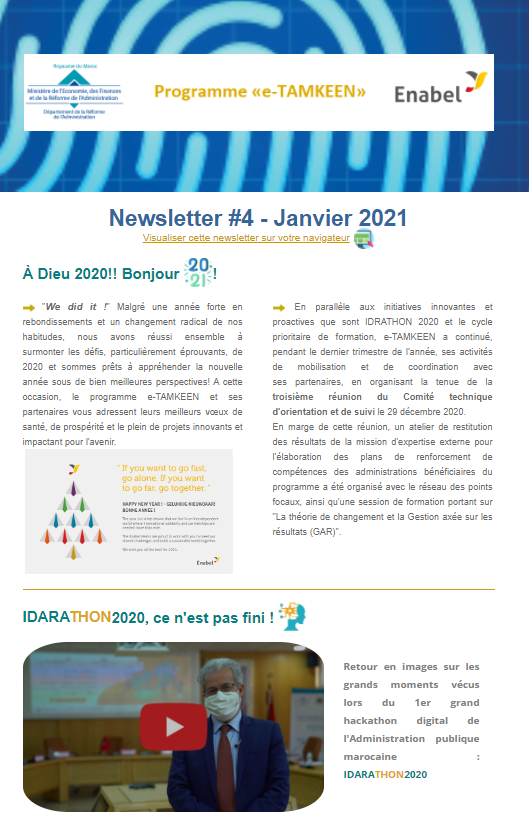
Consultez la 4éme newsletter trimestrielle de l’intervention e-TAMKEEN du Maroc!
Bassam ALAOUI MDAGHRI | 29/01/2021
Cette édition s’intéresse particulièrement aux réalisations de la première édition du Hackathon dédiée à l'Administration marocaine innovante "IDARATHON".Elle informe également sur l’actualité digitale dans le secteur public et des outils digitaux les plus utiles en cette période de Covid-19.Consultez la newsletter via ce lien : http://bit.ly/36to9Ii
-
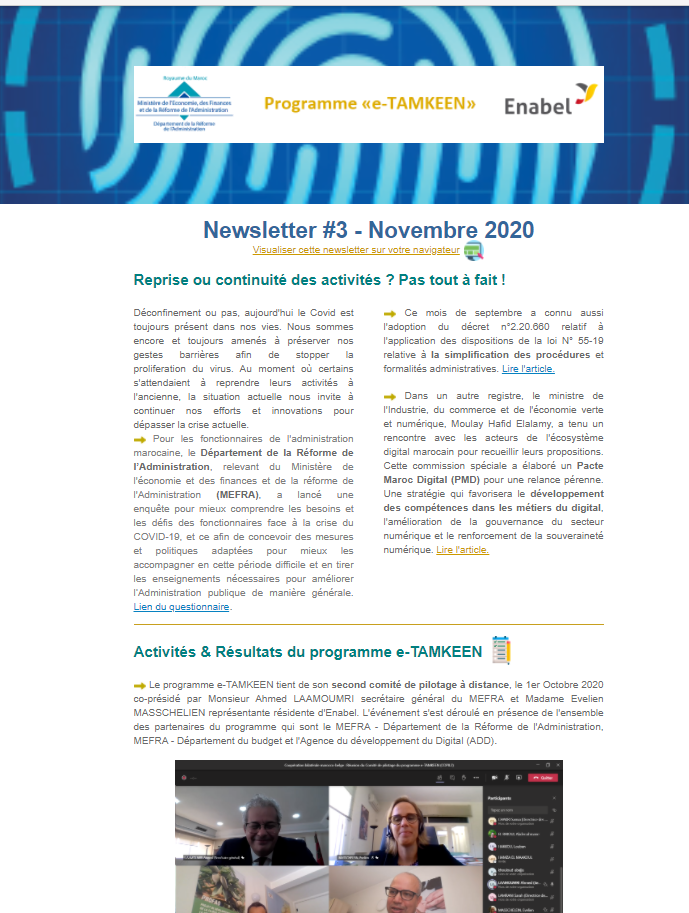
Consultez la 3éme newsletter trimestrielle de l’intervention e-TAMKEEN du Maroc!
Bassam ALAOUI MDAGHRI | 29/01/2021
Retour sur le lancement du cycle de formation prioritaires qui a permis le renforcement des compétences d'une centaine de fonctionnaires en réponse aux besoins de l'Administration en période Covid.Ce cycle de formation initié en juillet sur les thématiques du télétravail et des plans de continuités d'activités, la communication digitale et la eRéputation se sont déroulées de juillet à décembre 2020. Consultez la newsletter via ce lien : http://bit.ly/3ag9GAI
-
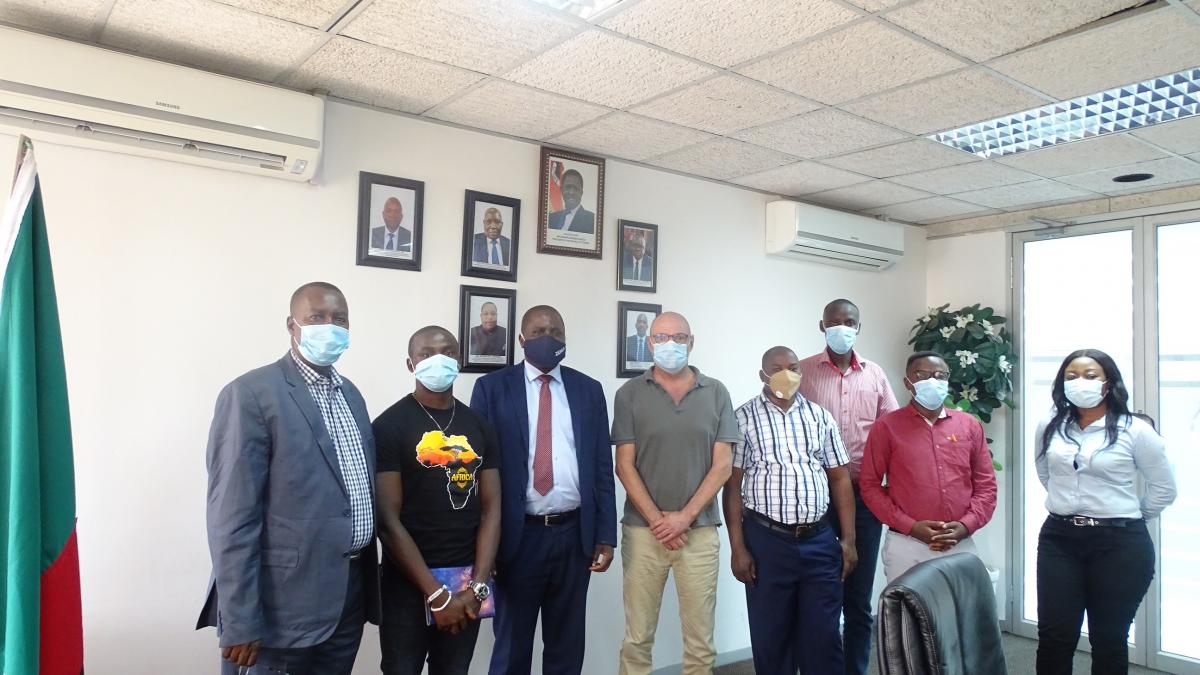
Au Burundi, l’Autorité du lac Tanganyika et les autorités zambiennes mettent en œuvre les activités de suivi du projet Latawama
Rodrigue NIYONGABO | 29/01/2021
L’équipe du projet Latawama et l’Autorité du Lac Tanganyika ont piloté, en Zambie, une mission de cadrage des activités du projet Lake Tanganyika Water Management Project (LATAWAMA) mis en œuvre par Enabel sur financement de l’Union européenne.La mission s’est déroulée du 5 au 19 décembre 2020. Des échanges avec les autorités de la Province Septentrionale à Kasama et du District de Mpulungu et des visites de terrain ont été organisées, une occasion de se fixer sur les actions à mettre en œuvre.Au cours des séances de travail avec les autorités provinciale et municipale, l’Intervention Manager Didier Cadelli et le Directeur de l’environnement de l’ALT, Gabriel Hakizimana ont rappelé l’importance de la concertation, préalable au déploiement des activités qui doivent rencontrer les besoins et les urgences locales.Les autorités administratives locales ont marqué leur intérêt pour un ensemble d’actions à financer par le projet en matière de gestion des déchets solides au profit direct des citoyens à travers un support technique, institutionnel et organisationnel des services techniques de la ville de Mpulungu et du secteur hospitalier.Outre les séances de travail, l’équipe a pu visiter plusieurs endroits de la ville et le long des rives du lac pour mieux comprendre les enjeux environnementaux et sanitaires et orienter les actions. Ce sont notamment les infrastructures publiques telles que les marchés, l’hôpital et certains centres de santé ainsi que l’environnement lacustre impacté par la pollution par le plastique et menacé par la montée des eaux du lac.« Une compréhension commune des actions à mettre en œuvre était nécessaire pour une atteinte des objectifs du projet » a laissé entendre Monsieur Chinakila, le commissaire de district de Mpulungu lors d’un entretien avec l’équipe. Une déclaration qui augure une bonne collaboration quant à la mise en œuvre des actions du projet.Par ailleurs, en collaboration avec Water Resources Management Authority (WARMA, Kasama) et Lake Tanganyika Research Unit, le projet LATAWAMA renforcera les capacités de suivi environnementale du Lac Tanganyika via la réhabilitation, l’équipement et le training du laboratoire de Mpulungu afin d’intégrer celui-ci dans le réseau des laboratoires de référence pour le suivi de la qualité des eaux du lac Tanganyika.L’ensemble des activités du projet sera soutenu par diverses campagnes d’information, de communication et de sensibilisation.Cette mission a été rendue possible par l’implication et le support technique de Richard Lungu, point focal de l’ALT en Zambie (Ministry of Water Development, Sanitation and Environmental Protection), de Mabo Lwabany (Lake Tanganyika Research Unit) et WARMA.
-
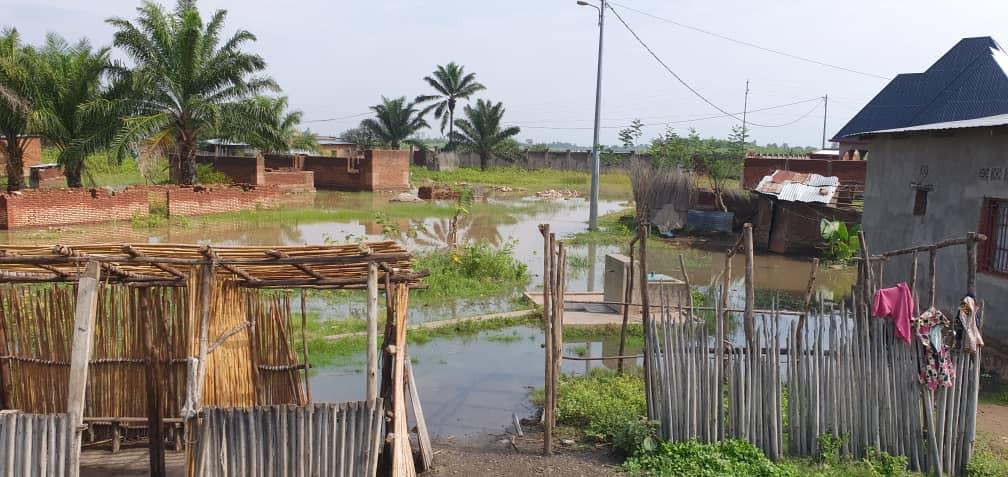
Burundi: Le contrôle de la montée du niveau du Lac Tanganyika : un nouvel enjeu pour le projet "Lake Tanganyika Water Management"
Rodrigue NIYONGABO | 29/01/2021
Depuis près d’un an, le niveau du lac Tanganyika monte et reste à un niveau élevé.De Bujumbura à Mpulungu en Zambie, le constat est le même : inondation, destruction d’habitations et d’infrastructures, disparition des plages et destruction de la végétation. Outre les dégâts matériels et humains, les activités liées à la pêche sont aussi impactées car nombre de villages de pêcheurs et de site de débarquement ont été fortement impactés.Face à ce phénomène complexe et destructeur, le projet Lake Tanganyika Water Management mis en œuvre par Enabel sur financement de l’Union européenne, en collaboration avec l’Autorité du Lac Tanganyika ont décidé d’investir dans la formulation d’un nouveau projet dédié au suivi quantitatif des ressources en eau du Lac en lien avec les changements climatiques. La formulation de ce projet a été initiée le 12 janvier 2021 et associe le bureau d’étude SHER (Namur, Belgique), l’Autorité du Lac Tanganyika et le projet LATAWAMA. L’objectif dudit projet est de disposer d’un système moderne et efficace de surveillance du niveau du lac afin de connaitre avec précision les apports et les pertes en eau qui définissent le niveau du Lac.Outils de surveillance, de prédiction et d’alertes pourront ainsi être développés au profit des pays riverains et au bénéfice des populations. Ce projet visera aussi à développer les niveaux de connaissances des institutions de recherche et universités des pays riverains. Pour rappel, le niveau du lac Tanganyika fluctue de l’ordre de 0,8 m naturellement en fonction des saisons. Ces fluctuations sont la conséquence d’une modification de l’équilibre entre les apports d’eau (pluviométrie au niveau du lac et débits des affluents du Lac) et les pertes (évaporation au niveau du lac et débits de sortie au niveau de la rivière Lukuga à Kalemien RDC).Depuis le 19ème siècle, le niveau du lac a connu d’importantes fluctuations avec un niveau maximum du lac de 783,6 m en 1878 et un minimum de 772,5 m en 1902. L’amplitude observée est de 11 m.La dernière montée importante du niveau du lac date des années 1964/65 avec un niveau de 776,5 m.Les périodes de montée et de baisse du niveau peuvent être longues faisant écarter durablement le niveau de la valeur moyenne de 772,7 m.Généralement, le même phénomène peut être observé au niveau des autres lacs de l’Afrique de l’est.
-
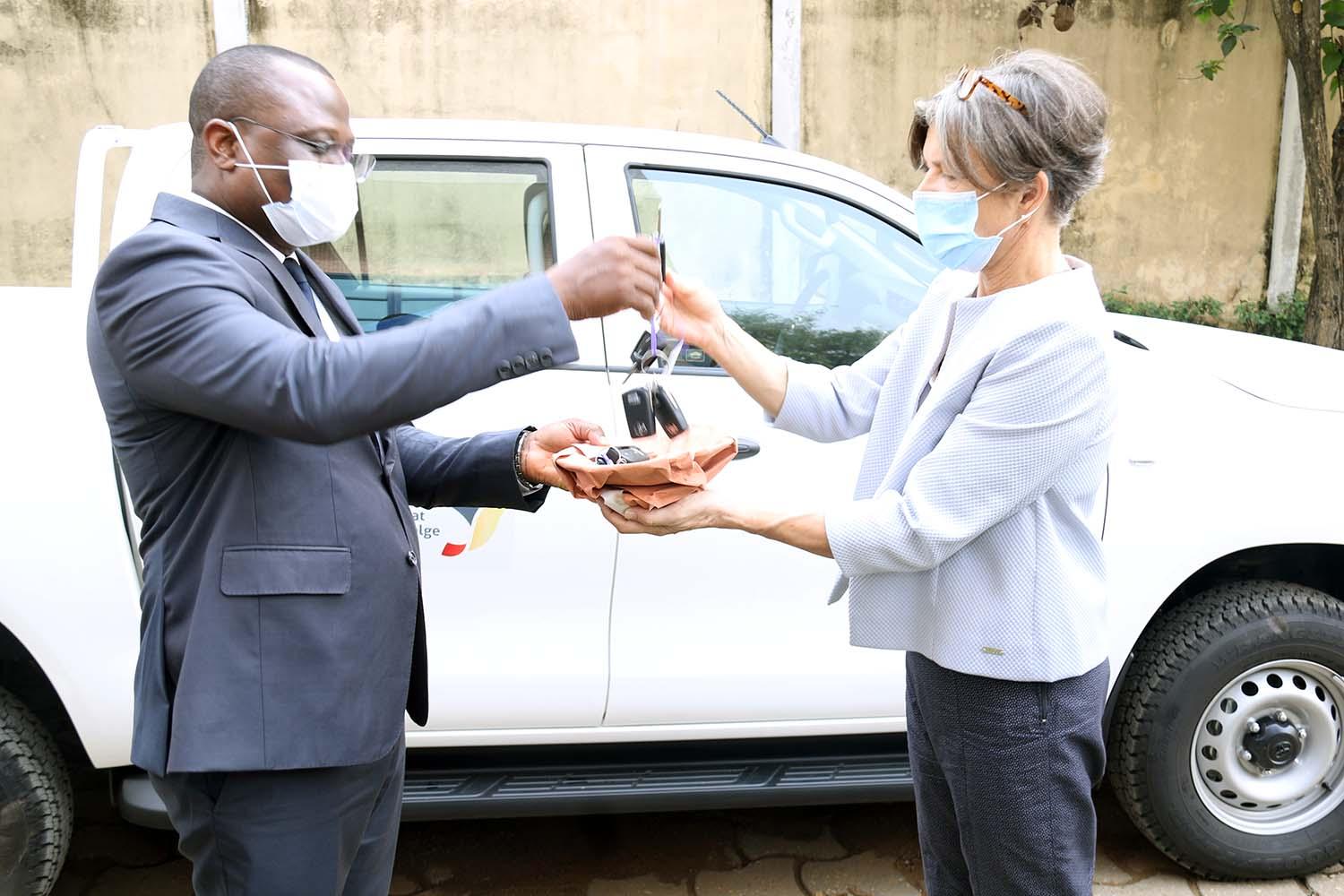
Au Bénin, Enabel fait don de matériels roulants et de mobiliers au Ministère des Infrastructures et du Transport
Reece-hermine ADANWENON | 26/01/2021
Un échange de protocole d’accord de transfert d'équipements et de matériels a eu lieu entre entre Mme Mélanie SCHELLENS, Chef de la Coopération à l’Ambassade de la Belgique au Bénin, Mr Joseph AHISSOU, Directeur de Cabinet du Ministère des Infrastructures et du Transport et Mr Jean-François MICHEL, Représentant Résident d' Enabel Bénin. C’est le geste ultime qui a marqué la cérémonie officielle de remise d’équipements roulants, de mobiliers de bureau, de matériels de communication, de matériels de protection individuel et d’équipements informatiques aux directions du Ministère des Infrastructures et des Transport. Une cérémonie fort simple a réuni ce mardi 26 janvier 2021 à la Salle de conférence du Conseil National des Chargeurs du Bénin les membres du comité de pilotage du Projet d’Appui au développement du Secteur Portuaire (PASPort) et les acteurs du secteur portuaire. D’un cout global de Cent cinq millions six cent quarante-cinq mille cent cinquante-quatre (105 645 154 FCFA) Francs CFA soit 161.055 Euros, ces équipements et matériels sont constitués de : (03) véhicules Toyota ; (04) motos Dame Haojue ; (12) ordinateurs de marque DELL ; (18) Onduleurs Eaton ELLIPSe ; (09) imprimantes blanc noir HP Laserjet Pro; (06) imprimantes couleur HP Color Laserjet Pro ; 01 tablette tactile HUAWEI ; (02) photocopieurs A4 (Image RUNNER 2520/i) ; (06) scanners de documents HP Scanjet Pro ; (01) table de réunion ; (11) bureaux de L 1,80 m et l 90 cm avec caisson sur roulette et retour, (21) fauteuils ergonomiques réglages en hauteur avec basculement en arrière ; (03) armoires métalliques à deux battants importées ; (02) appareils Photo Professionnels NIKON, (06) combinaisons de travail ; (30) Kits (gilets reflectorant + casques + chaussures). Cette dotation répond à la volonté de l’Agence belge de développement (Enabel) d’accompagner la Direction des Transports Terrestres (DTT) et la Direction de la Marine Marchande (DMM) dans l’accomplissement de leurs missions régaliennes en lien avec le secteur portuaire notamment en matière de qualité du fret des marchandises débarquées au port sur le corridor du Bénin et de sûreté/sécurité maritime et portuaire ainsi que de protection de l’environnement marin. Cet équipement va bénéficier directement à 24 agents issus de ces deux directions (7 à la DTT et 17 à la DMM).Les bénéficiaires indirects sont les clients internes et externes de ces deux administrations, bien plus nombreux. Selon Mme Mélanie Schellens, Chef de la Coopération à l’Ambassade de Belgique au Bénin, cet appui témoigne de l’ambition des deux pays de : (i) promouvoir la création d’emplois décents et durables, (ii) d’augmenter les revenus des acteurs économiques et des ménages et (iii) d’améliorer les équilibres macro-économiques du Bénin via l’amélioration de la compétitivité du Port de Cotonou qui représente aujourd’hui 30% du PIB du Bénin et 85% des recettes douanière. Joseph AHISSOU, Directeur de Cabinet du Ministère des Infrastructures et du Transport a, pour sa part, exprimé au nom du gouvernement du Bénin toute la gratitude du peuple béninois au Royaume de la Belgique et plus particulièrement aux initiateurs et contributeurs au financement du projet (PASport) qui constitue l’un des principaux piliers de développement de la coopération bilatérale bénino-belge sur la période quinquennale de 2019-2023.Pour lui, l’impact des actions du projet PASPort sur la compétitivité du Port Autonome de Cotonou est d’ores et déjà une tangible réalité. Il a pris l’engagement que les matériels remis seront affectés aux agents et usagers auxquels ils sont destinés pour l’accomplissement de la mission à eux assignée. Par ailleurs, il est important de signaler que la Belgique a décidé depuis fin 2018, de payer les droits de douanes et taxes diverses sur les biens importés dans le cadre des nouvelles actions de coopération. Cette pratique s’inscrit dans le cadre de l’ « Addis Tax Initiative » qui vise une meilleure mobilisation et maitrise des ressources internes des pays en voie de développement. A titre d’exemple, environ 28 % de taxes et frais ont été réglés sur l’acquisition des véhicules, soit environ Seize millions trois cent quatre-vingt-dix-huit mille neuf cent vingt-cinq (16 398 925) Francs FCFA ou 25 000 euros. Il est tout aussi important de remarquer que cette remise n’est qu’un aspect de l’appui qu’apporte ou qu’apportera le projet PASPort au M.I.T, puisqu’un programme de formation des cadres et agents, et un travail sur l’élaboration des textes de politique et stratégie dans le domaine des mandats des deux directions est prévu par ailleurs, et déjà en cours pour partie.
-
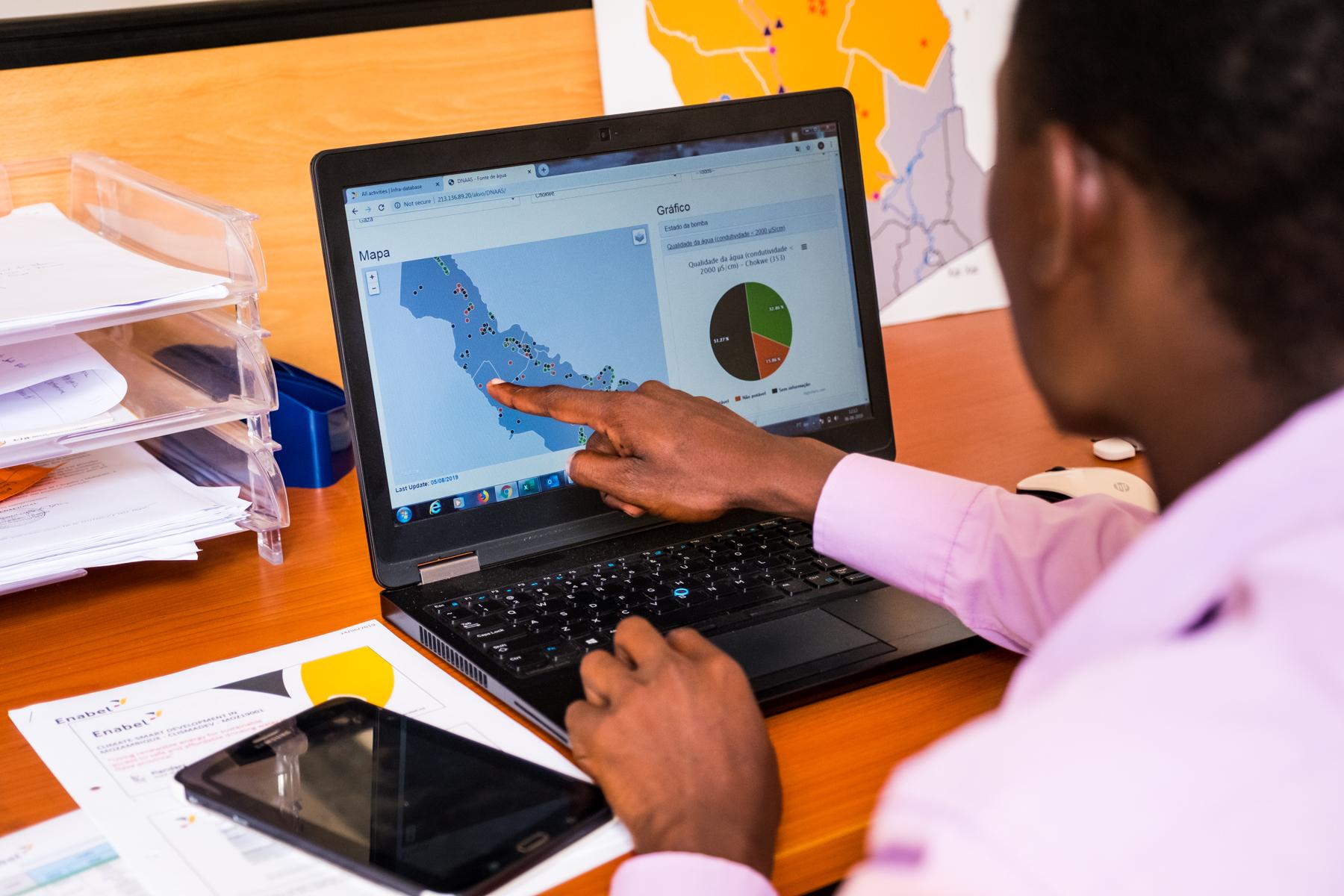
In Mozambique, Enabel’s extension of its Study and Expertise Fund allows to mobilise expertise in the fight against climate change
Akila MUNIR | 21/01/2021
By: Jesse Waterschoot and Akila MunirEnabel’s Study and Expertise Fund in Mozambique is in place since 2014. The aim of this project is to support sectors through studies, consultancies and providing technical expertise in priority areas identified for the cooperation between Belgium and Mozambique. This includes climate change related themes such as (renewable) energy, water management, agriculture, as well as the health sector and gender. With a budget of 750,000 euros, the fund supported consultancies and expertise requests from the line ministries. The results and insights of studies provided by the fund have impacted recent governmental policy changes, such as the strategy for fighting gender-based violence and the water strategy for rural areas. While the fund has continuously received requests, budget constraints limited the number of commitments possible. Due to its relevance and significance in the Enabel portfolio in Mozambique, in December 2020, an addendum to this project was signed with an additional budget of 1,25 million euro and extension up to 2023. This allows the mobilisation of several key studies in Enabel Mozambique’s priority areas going forward. Additionally, part of these funds will be directed to support specialised technical assistance, namely a Climate Finance Advisor from the National Determined Contribution (NDC) Partnership to assist Mozambique to reach its commitment in the Paris 2015 Climate Change agreement.Combatting global carbon emissionEnabel developed strong expertise and institutional partnerships with technical ministries in energy and water projects, closely related to climate change mitigation and adaptation strategies. Mozambique is extremely vulnerable to climate change due to its long-coast line and dependency on the agricultural sector. Consequently, the country suffered under the cyclones and droughts of the past years. Combatting global carbon emission and joining multilateral climate initiatives is therefore crucial for Mozambique.One of the most important recent multilateral initiatives on climate change is the 2015 Paris Agreement, that aims to keep the global average of temperature increase below 2°C. Countries that ratified this agreement committed to limit global warming and support sustainable development initiatives. In light of this, all countries will provide a national strategy to cut their carbon emission in their national determined contributions (NDC). Of course, not all countries have equal access to the expertise and knowledge to reach this goal. To tackle this issue and promote multilateral climate cooperation, the NDC Partnership was founded, which ensures that countries receive assistance to achieve ambitious climate targets. Countries can request support for technical assistance or financial aid to the NDC secretary, that subsequently reaches out to other member states and requests them to assist.Mozambique’s climate ambitionsMozambique submitted an ambitious mitigation commitment plan to reduce 76.5 MtCO²e from 2020 to 2030, and in 2018 it launched a comprehensive partnership plan for climate action that includes 11 sectors. To succeed, the government identified the need for an Economic Planning and Coordination Advisor and a Climate Finance Advisor, so the Ministry of Economy and Finance decided to request assistance for those two experts to the NDC secretariat. While the Economic Planning and Coordination Advisor is being financed by the World Bank, the NDC secretariat reached out to Belgium, a member since June 2017, for funding the second advisor, because of Belgium’s active engagement in climate change across the globe, specifically with an ongoing bilateral cooperation in Mozambique.Due to the noteworthy coordination between the different Belgian actors, including the FPS Public Health, Food Safety and Environment (focal point), FPS Foreign Affairs (focal point), and the Belgian development agency, the necessary support was secured via Enabel Mozambique’s Study and Expertise Fund. Truly a #TeamBelgium approach in actively supporting initiatives for climate action. In this way, Enabel was able to commit the necessary funds for the Climate Finance Advisor and helps contributing to Mozambique’s NDC engagements. The Enabel funded Climate Finance Advisor will work across line ministries and mobilise development partners to identify and develop projects and proposals to access resources from national and international sources to assist Mozambique in achieving its NDC commitments. The addendum of the Study and Expertise Fund will be a useful tool between the Belgo-Mozambican cooperation to continue to contribute to the promotion of expertise and knowledge transfer, national and sector strategy plans and sustainable development goals.
-
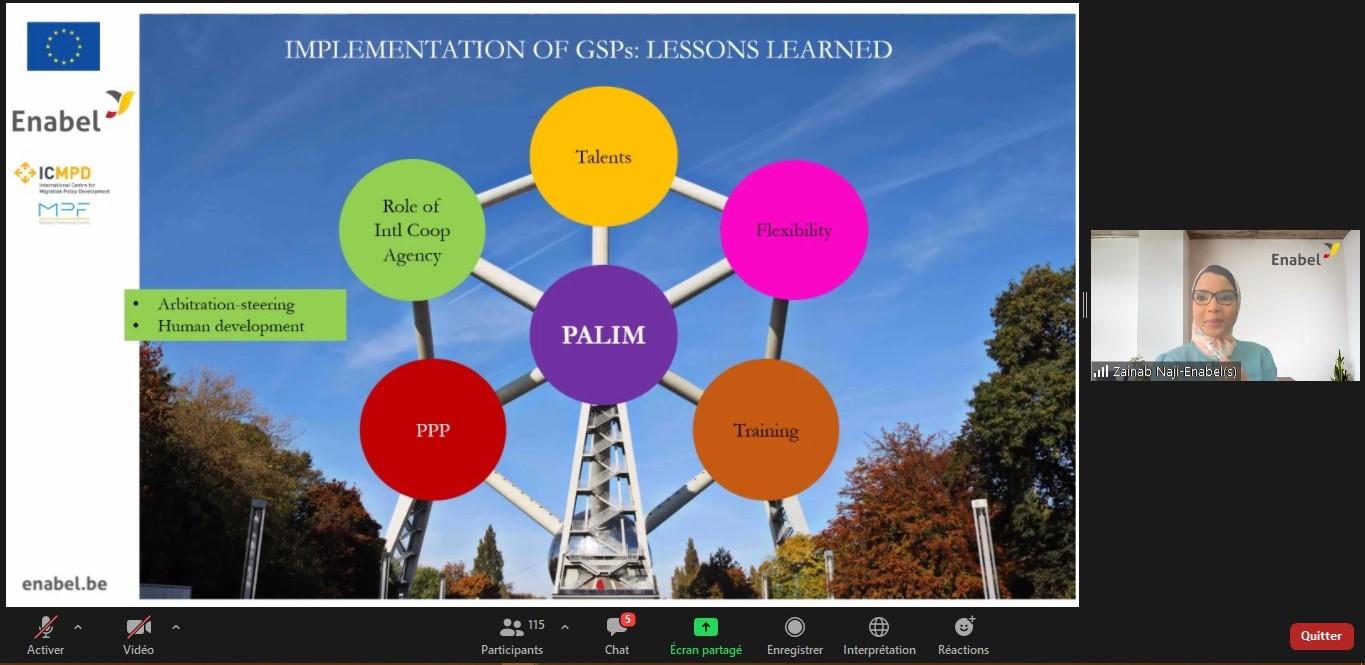
Maroc: Le projet PALIM présenté au "Global Forum on Migration and Development"
Meriem HILALI | 20/01/2021
Lors de La 13éme édition du "Global Forum on Migration and Development", tqui s'est enu du 18 au 26 janvier 2021 à Dubaï, Enabel a exposé cinq principales leçons apprises durant la mise en œuvre du projet PALIM. Enabel met en œuvre les projets PALIM et THAMM suivant le modèle "Global Skills Partnership" ou "Partenariat Mondial des Compétences", qui considère que la mobilité du travail n'est bénéfique pour toutes les parties que si les employés potentiels peuvent trouver un emploi qualifié dans leur pays d'origine et dans le pays de destination.Le PALIM vise essentiellement la formation de talents au Maroc et leur mise à l'emploi, tant au Maroc qu'en Belgique, via un schéma de mobilité concertée. Ces projets s'alignent également sur des objectifs mondiaux importants tels qu'une meilleure gestion des migrations, conformément aux objectifs liés à la migration du Programme des objectifs de développement durable à l'horizon 2030. Ils s'alignent également sur le cadre global de la politique de migration extérieure de l'Union européenne, l'agenda européen en matière de migration et l'approche globale de la migration et de la mobilité.
-
Bénin: Nouvel appui du projet EQUITE en soutien au plan national de riposte contre la Covid-19
Reece-hermine ADANWENON | 19/01/2021
Monsieur Marc VIZY, Ambassadeur de France au Bénin a procédé le mardi 19 janvier 2021 à une remise de matériels roulants, de tests PCR et de kits de prélèvements pour le dépistage de la Covid-19 à Monsieur Benjamin HOUNKPATIN, Ministre de la Santé. Cette cérémonie qui s’est tenue dans l’enceinte du Ministère de la Santé en présence de Monsieur Jérôme BERTRAND-HARDY, Directeur de l’Agence Française de Développement (AFD) au Bénin et de Monsieur Jean-François MICHEL, Représentant Résident d'Enabel au Bénin, réaffirme l’engagement de la France à la mise en œuvre du plan de riposte contre la Covid-19 au Bénin, après une première remise de matériels de réanimation en juillet 2020. D’un montant de 460 069 413 francs CFA, le lot de matériels et équipements acquis via le projet EQUITE mis en œuvre par Enabel au Bénin est composé de :• 5 ambulances pour le département des Collines, • 2 véhicules pour l’Agence Nationale de Transfusion Sanguine (ANTS) du Borgou-Alibori, • 2 véhicules pour l’Agence Nationale de Transfusion Sanguine (ANTS) des Collines,• Et 34 000 tests PCR COVID-19 et 44 000 kits de prélèvement. Ces équipements à destination des différents centres de prise en charge du pays permettront d’améliorer considérablement les soins apportés aux malades hospitalisés, en particulier les cas les plus graves et de renforcer durablement le système de santé du Bénin. Selon M. Marc VIZY, Ambassadeur de France au Bénin, cette deuxième contribution de la France au Plan de riposte du Bénin permettra de renforcer davantage les capacités du Ministère de la Santé en matière de diagnostic/dépistage de l'épidémie du Coronavirus. En effet, à travers le projet Equité (financé par l’Agence Française de Développement (AFD)) dont le budget a été réaménagé au profit de la lutte contre la Covid-19 (une subvention de 11 millions d’Euros pour la lutte contre la pandémie et un financement complémentaire de 2 millions d’Euros), la France appuie le Bénin pour une réponse rapide au plan de riposte portant ainsi sa contribution totale à 3 millions d’euros, soit 2 milliards de FCFA. Pour le Professeur Benjamin Hounkpatin, l’urgence de la réponse à la crise sanitaire engendrée par la Covid-19 est un défi majeur pour tous les systèmes de santé du Monde. « En ce moment difficile, le gouvernement et le peuple béninois ont ressenti la solidarité et la proximité du gouvernement français à travers divers appuis pour soutenir les actions de riposte engagées dans notre pays. Nous avons apprécié que l’Agence Française de Développement ait accepté d’apporter cette réponse rapide au Plan de riposte du Bénin à travers une adaptation du budget du projet EQUITE dont une part a été réorientée à la lutte contre la pandémie de Coronavirus » a, t-il ajouté. Il a ensuite salué le rôle stratégique important joué par Enabel dans la mise en œuvre du Projet Equité et qui a permis d’acquérir dans des délais relativement courts le lot d’équipements. A l’en croire, ce matériel contribuera sans nul doute à améliorer de manière substantielle, les capacités de diagnostic du personnel soignant en ce moment de recrudescence des cas au Bénin ainsi que le transfert et le traitement des patients atteints de la Covid 19. L’appui en ambulance et en moyens roulants pour les Centres de transfusion sanguine renforcera davantage le système de santé du Bénin et la capacité à relever le défi du Bénin en matière de prise en charge des autres maladies, dira-t-il. A ce propos, Dr Benjamin Hounkpatin a exprimé la reconnaissance du gouvernement du Bénin à Enabel, à l’Agence Française de Développement, ainsi qu’à l’équipe du projet EQUITE pour les efforts fournis. « Les Directeurs Départementaux de la Santé « DDS » seront instruits pour un usage rationnel des véhicules et ambulances », a-t-il promis.
